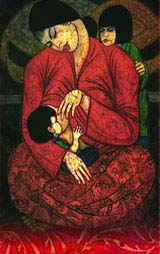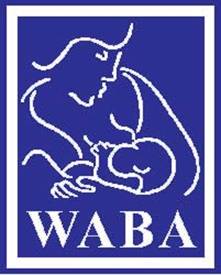 The World Alliance for Breastfeeding Action (WABA) was formed on 14 February, 1991. WABA is a global network of organizations and individuals who believe breastfeeding is the right of all children and mothers and who dedicate themselves to protect, promote and support this right. WABA acts on the Innocenti Declaration and works in close liaison with UNICEF.
The World Alliance for Breastfeeding Action (WABA) was formed on 14 February, 1991. WABA is a global network of organizations and individuals who believe breastfeeding is the right of all children and mothers and who dedicate themselves to protect, promote and support this right. WABA acts on the Innocenti Declaration and works in close liaison with UNICEF.
A world where breastfeeding is the cultural norm, where mothers and families are enabled to feed and care optimally for their infants and young children thus contributing to a just and healthy society.
To protect, promote and support breastfeeding worldwide in the framework of the Innocenti Declarations (1990 and 2005) and the Global Strategy for Infant and Young Child Feeding through networking and facilitating collaborative efforts in social mobilisation, advocacy, information dissemination and capacity building.
To foster a strong and cohesive breastfeeding movement, which will act on the various international instruments to create an enabling environment for mothers, thus contributing to increasing optimal breastfeeding and infant and young child feeding practices.
Funding Policy
WABA does not accept funds or gifts from manufacturers or distributors of breastmilk substitutes, related equipment such as feeding bottles and teats, commercial foods for breastfeeding mothers, or commercial complementary foods. It also does not accept funds or gifts from manufacturers of other products commonly used in infant feeding such as breastpumps and encourages WABA endorsers to adopt the same ethical stance.
Structure
WABA is a global network that encompasses all working at the international, regional, national, and community level to protect, promote and support breastfeeding.
Everyone who is committed to a breastfeeding culture can be part of WABA: non-governmental organizations, community activists, health care workers, professional associations, university teaching staff, researchers, health officials and others.
WABA SECRETARIAT
The Secretariat coordinates and maintains the flow of information between the General Assembly structures and the wider constituency of WABA. Its small office serves mainly to network and facilitate action in support of World Breastfeeding Week, and coordinate the other programmes of WABA.
WABA GENERAL ASSEMBLY
The WABA General Assembly plays a larger role in policy making and has the right to vote on the Steering Committee members.
The WABA General Assembly consist of:
- Steering Committee
- Core Partners
- Regional Focal Points
- Task Force Coordinators and Co-Coordinators
- International Advisory Council (non-voting except for co-chairs)
- Working groups (non-voting members)
Steering Committee
The Steering Committee is the principal management and policy making body of WABA.
1. VACANT – Co-Chair
2. Rukhsana Haider – Co-Chair
3. Mimi Maza – Member
4. Hussein Tarimo – Member
5. Anne Batterjee – Member
6. Maryse Arendt Lehners – Member
7. Felicity Savage – Appointed Chairperson
8. Anwar Fazal – Chairperson Emeritus/Appointed Member
Core Partners
Core Partners are organisations and networks which work internationally mainly on breastfeeding related issues, and which endorse WABA.
Regional Focal Points
Regional Focal Points are institutions or organisations that assist WABA in networking, information support and social mobilisation activities at the regional level. These activities include:
- communicating, when appropriate, between WABA Secretariat and country contact points and relevant groups and individuals;
- coordinating WBW
- translating, adapting and disseminating WBW materials and other appropriate WABA and partner materials;
- representing WABA at regional level;
- facilitating the endorsement of WABA;
- facilitating communication and common actions between WABA endorsers and other breastfeeding related organisations, and
- facilitating common actions between WABA’s core partners, endorsers and allies from the human rights, health, environmental, and women’s movements among others.
